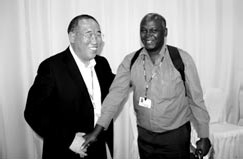Prime
Kyoto a Mexican standoff at Cancun
By Li Xing, Lan Lan and Li Jing (China Daily)
Updated: 2010-12-10 11:19
 |
Large Medium Small |

|
|
CANCUN, Mexico - The two-week climate talks in this resort city have entered its last stages, with the impasse of a second period of the Kyoto Protocol still blocking a positive outcome from the meeting.
"We hope the Cancun meeting would make decisions over the issue of a second commitment period of the protocol," Xie Zhenhua, head of the Chinese delegation, said in a meeting with domestic and international NGO representatives on Thursday.
He repeated China's position by saying the country will "defend" and "stand firm on" the protocol.
"We want to see the protocol continue to play a very important role under new circumstances by further improving it," he said.
Xie said it is an "environmental integrity" issue for developed countries now unwilling to continue their commitment.
Developed countries, which are not a party to the protocol, should also make their targets to reduce greenhouse gas emissions comparable to those made under the protocol.
The protocol also requires developing countries to make voluntary efforts for sustainable development and appropriate mitigation.
"No matter what happens in the negotiations, China is committed to taking mitigation actions," Xie said.
Jeremy Hobbs, executive director of Oxfam International, called the European Union to take firm action to save the Kyoto Protocol.
"We think the EU's leadership is absolutely important in this process," Hobbs said, adding that the EU has a "central role" to play in finding resolutions on the protocol and on climate finance.
"Now it's time for the negotiators to stop blocking and get to work negotiating."
A source close to the Chinese delegation said a second period of commitment to the Kyoto Protocol must be included, adding that details of time scale and targets can be discussed later.
Besides the protocol, delegates are dragging their feet on issues such as the fast-start fund, observers said.
Xie said the fast-start fund is something that developing countries, especially the least developed and small island nations, are very concerned about.
On the transparency issue which has attracted much attention, Xie said China has shown its flexibility and compromise.
"We agree with the international consultation and analysis (ICA); we agree that we need to have regulations on targets, principles of ICA on voluntary actions using domestic resources, but details need to be worked out, " Xie said.
But the principles should be non-invasive, non-punitive, respecting national sovereignty and be based on mutual trust, he said.
On Thursday, chief negotiators and ministers have been seen shuttling from one meeting to another, trying to find ways to resolve the impasse created by Japan and a few other developed countries unwilling to continue the second period of commitment to the protocol.
Negotiators are preparing for a long night as the deadline for reaching an outcome at Cancun approaches.
Assistant Foreign Minister Liu Zhenmin, also a member of Chinese delegation, told reporters to get prepared to stay late into night after a ministerial-level meeting on Thursday to take stock of the progress and divisions.
"We're still working on that. Not much progress has been made," Su Wei, China's chief negotiator, said.
China Daily
